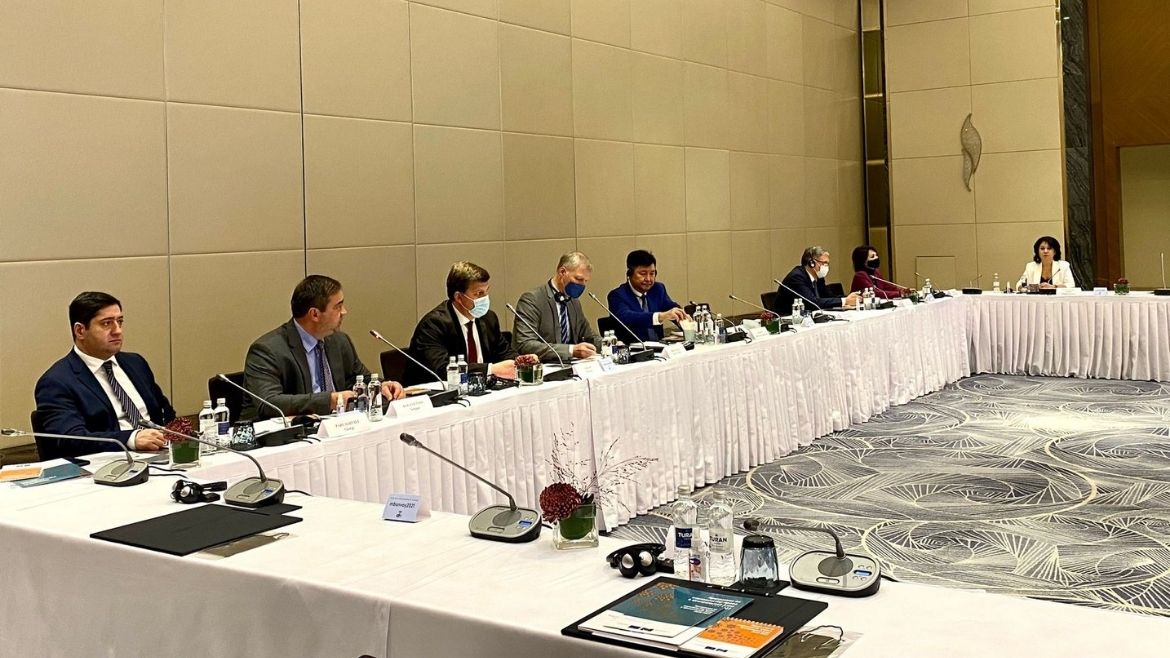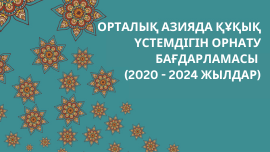The Council of Europe, the European Union, the Supreme Court and other stakeholders of Kazakhstan addressed issues related to the ongoing reforms in the justice sector in Kazakhstan. These were the focus of the two-day international round table "Reforms of the judiciary in Kazakhstan: Addressing new challenges by using best international practices”, held in Nur-Sultan in a hybrid format on 27-28 October 2021. The event was organised with the Supreme Court of the Republic of Kazakhstan in the framework of the Central Asia Rule of Law Programme 2020-2023 – a joint initiative of the Council of Europe and the European Union.
Council of Europe experts from the Venice Commission, the European Commission for the Efficiency of Justice (CEPEJ) and the Human Rights Education for Legal Professionals (HELP) programme, as well as representatives of the Supreme Court of Kazakhstan, the Ministry of Justice, members of Parliament and other institutions exchanged views about adversarial trial and equality of arms in criminal proceedings, implementation of international standards and best practices in administrative justice, the use of new technologies to improve the efficiency of justice, and new approaches in judicial training. Over 150 participants from Kazakhstan, Kyrgyzstan, Armenia, Azerbaijan, Estonia, Georgia, Greece, Moldova, Russia and Slovenia joined the event physically and online.
The Head of the European Union Delegation to Kazakhstan, Ambassador Kestutis Jankauskas, emphasised that the European Union and the Council of Europe will continue to work hand in hand to support the ongoing reforms and contribute to a more efficient functioning of State institutions in Kazakhstan. Mikhail Lobov, Head of the Department for the implementation of human rights, justice and legal co-operation standards of the Council of Europe, confirmed that the Council of Europe stands ready to continue to accompany the authorities of Kazakhstan in the reform process based on the standards developed by the Organisation, by providing constitutional and legal expertise through the Venice Commission and developing training courses for legal professionals through the HELP programme. The Chairman of the Supreme Court of the Republic of Kazakhstan, Zhakip Asanov, underlined the importance of the issues discussed during the round table, opening new possibilities for increased co-operation with the Council of Europe.
For more information, please contact:
Tatiana BAEVA, Spokesperson / Media Officer, Directorate of Communications, Council of Europe.
Hristo HRISTOV, Project manager, Central Asia Rule of Law Programme, Venice Commission, Council of Europe.
Mariia POLEZHAEVA, Communication Support Assistant, Central Asia Rule of Law Programme, Council of Europe.
Elnura ABAKANOVA, Communications Officer, EU Delegation to the Republic of Kazakhstan.
Background:
The Central Asia Rule of Law Programme 2020-2023 aims to reinforce human rights, rule of law and democracy in Central Asian countries in accordance with European and other international standards by offering assistance to reform processes, based on a demand-driven approach. The Programme provides support to Kazakhstan in three areas:
· Facilitating the creation of a common legal space between Europe and Central Asia and enhancing human rights protection (HELP in Central Asia);
· Promoting transparency and action against economic crime;
· Promoting efficient functioning of state institutions and public administration.
For more information on the Central Asia Rule of Law Programme.
Kazakhstan is a member of various Council of Europe bodies such as the Venice Commission and has an observer status to the European Commission for Efficiency of Justice (CEPEJ).
The Venice Commission has adopted an important number of opinions concerning the independent and efficient functioning of the judiciary in its 62 member states, including Kazakhstan. Among other texts examined upon request from the authorities, the Commission has adopted legal opinions on the country's Constitution and draft legislation related to administrative justice.
Recording of the round table on 27 October 2021



